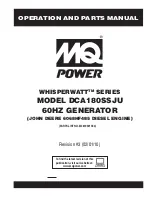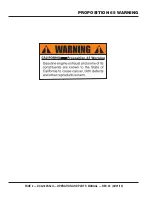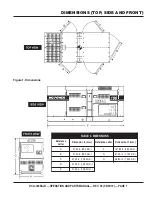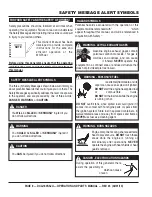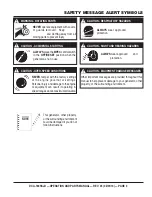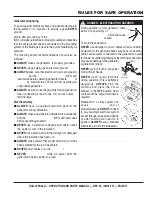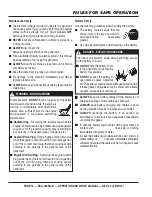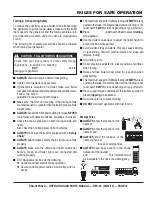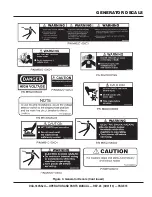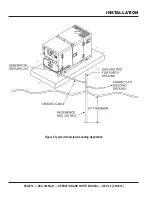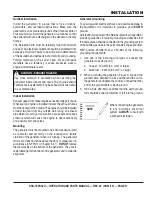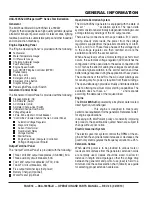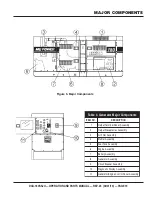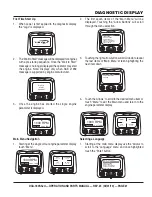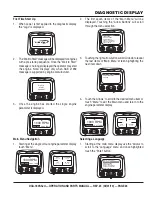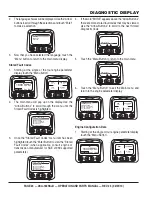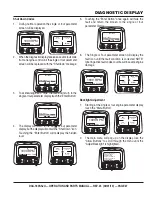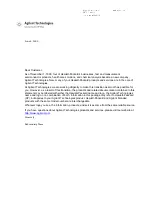
PAGE 12 — DCA-180SSJU — OPERATION AND PARTS MANUAL — REV. #3 (02/01/10)
RULES FOR SAFE OPERATION
Battery Safety
Use the following guidelines when handling the battery:
■
The battery contains acids that can
cause injury to the eyes and skin. To
avoid eye irritation,
wear safety
glasses.
■
Use well insulated gloves when picking up the battery.
Maintenance Safety
■
The electrical voltage required to operate the generator
can cause severe injury or even death through physical
contact with live circuits. Turn all circuit breakers
OFF
before performing maintenance on the generator.
■
NEVER
lubricate components or attempt service on a
running machine.
■
ALWAYS
disconnect the
before performing service on the generator.
■
Follow all Battery Safety Guidelines listed in this manual
when handleing or servicing the generator.
■
ALWAYS
allow the machine a proper amount of time to
cool before servicing.
■
Keep the machinery in proper running condition.
■
Fix damage to the machine immediately and always
replace broken parts.
■
ALWAYS
service air cleaner frequently to prevent engine
malfunction.
To prevent burns,
DO NOT
touch or open any of the below
mentioned components while the engine is
running or immediately after operations.
Always allow sufficient time for the engine
and generator to cool before performing
maintenance.
■
Radiator Cap
- Removing the radiator cap while the
engine is hot will result in high pressurized, boiling water
to gush out of the radiator, causing severe scalding to
any persons in the general area of the generator.
■
Coolant Drain Plug
- Removing the coolant drain plug
while the engine is hot will result in hot coolant gushing
out of the coolant drain plug, therefore causing severe
scalding to any persons in the general area of the
generator.
■
Engine Oil Drain Plug
- Removing the engine oil drain
plug while the engine is hot will result in hot oil gushing
out of the oil drain plug, therefore causing severe
scalding to any persons in the general area of the
generator.
WARNING - BURN HAZARDS
■
■
■
■
■
ALWAYS
keep the battery charged. If the battery is not
charged a buildup of combustible gas will occur.
■
■
■
■
■
ALWAYS
keep battery charging and cables in good
working condition. Repair or replace all worn cables.
■
■
■
■
■
ALWAYS
recharge the battery in an vented air
environment, to avoid risk of a dangerous concentration
of combustible gases.
■
■
■
■
■
In case the battery liquid (dilute sulfuric acid) comes in
contact with
, rinse skin or clothing
immediately with plenty of water.
■
■
■
■
■
In case the battery liquid (dilute sulfuric acid) comes in
contact with your
, rinse eyes immediately with plenty
of water and contact the nearest doctor or hospital to seek
medical attention.
The risk of an explosion exists when performing service
on the battery. To avoid
or
:
■
■
■
■
■
DO NOT
drop the battery. There
is the possibility of risk that the
battery may explode.
■
■
■
■
■
DO NOT
expose the battery to
open flames, sparks, cigarettes
etc. The battery contains combustible gases and liquids.
If these gases and liquids come in contact with a flame
or spark, an explosion could occur.
DANGER - EXPLOSION HAZARDS
Summary of Contents for DCA180SSJU WHISPERWATT SERIES
Page 2: ...PAGE 2 DCA 180SSJU OPERATION AND PARTS MANUAL REV 3 02 01 10 PROPOSITION 65 WARNING ...
Page 69: ...DCA 180SSJU OPERATION AND PARTS MANUAL REV 3 02 01 10 PAGE 69 1 NOTES ...
Page 72: ...PAGE 72 DCA 180SSJU OPERATION AND PARTS MANUAL REV 3 02 01 10 GENERATOR ASSY GENERATOR ASSY ...
Page 88: ...PAGE 88 DCA 180SSJU OPERATION AND PARTS MANUAL REV 3 02 01 10 BATTERY ASSY BATTERY ASSY ...
Page 90: ...PAGE 90 DCA 180SSJU OPERATION AND PARTS MANUAL REV 3 02 01 10 MUFFLER ASSY MUFFLER ASSY ...
Page 92: ...PAGE 92 DCA 180SSJU OPERATION AND PARTS MANUAL REV 3 02 01 10 FUEL TANK ASSY FUEL TANK ASSY ...
Page 105: ...DCA 180SSJU OPERATION AND PARTS MANUAL REV 3 02 01 10 PAGE 105 1 NOTES ...

